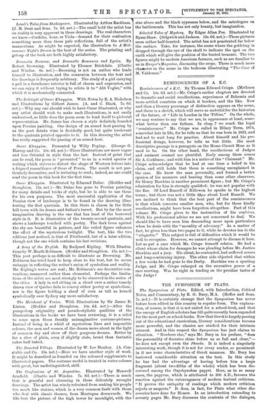REMINISCENCKS OF A K.C.
Reminiscences of a K.C. By Thomas Edward Crispe. (Methuen and Co. 10s. 6d. net.)—Mr. Crispe's earlier chapters are devoted to dramatic and social recollections, experiences of Bohemia and more settled countries on which it borders, and the like. Now and then a literary personage of distinction appears on the scene, and there is a sketch, which will serve as material for the historian of the future, of "Life in London in the 'Fifties." On the whole, we may venture to say that we are, in appearance at least, some- what better than our fathers. In chap. 7 we reach the legal "reminiscences." Mr. Crispe was called in Hilary Term, 1874, somewhat late in life, for he tells us that he was born in 1833, and had not to wait long for practice. About himself and his pro- fessional doings, however, he tells us but little. His most descriptive passage is a panegyric on the Home Circuit Mess as it used to be. On the other hand, the recollections of Judges and eminent counsel are plentiful. Early among them comes Sir A. Cockburn; and with him is a notice of the "Claimant." Mr. Crispe acknowledges that he had at one time a belief in his claim, and still holds that there is something unexplained in the case. He knew the man personally, and formed a better opinion of his manners and bearing than some other observers. Sir Henry Hawkins is another prominent figure ; but Mr. Crispe's admiration for him is strongly qualified: be was not popular with the Bar. Of Lord Russell of Killowen he speaks in the highest terms ; but there was not a little Opts about Lord Russell. We are inclined to think that the best part of the reminiscences is that which concerns smaller men, who, but for these kindly recollections, might have been forgotten altogether. Part of this volume Mr. Crispe gives to the instruction of his confreres. With his professional advice we are not concerned to deal. We should like to have seen him descending more upon particulars when he deals with the "morality of advocacy." As a matter of fact, he gives less than two pages to it, while he devotes ten to the "etiquette." This subject is full of difficulties which it would be well to recognise. However, we cannot attempt to discuss it here. Let us put a case which Mr. Crispe himself relates. He had a client whose claim for damages he was pleading before Mr. Justice Hawkins and a jury. His client, he contended, had suffered severe and long-continuing injury. The other side objected that within a few weeks he had gone to the Derby. Hawkins was a sporting Judge, and Mr. Crispe enlarged on the recreative power of a race meeting. Was he right in trading on the peculiar tastes of the Judge ?






















































 Previous page
Previous page